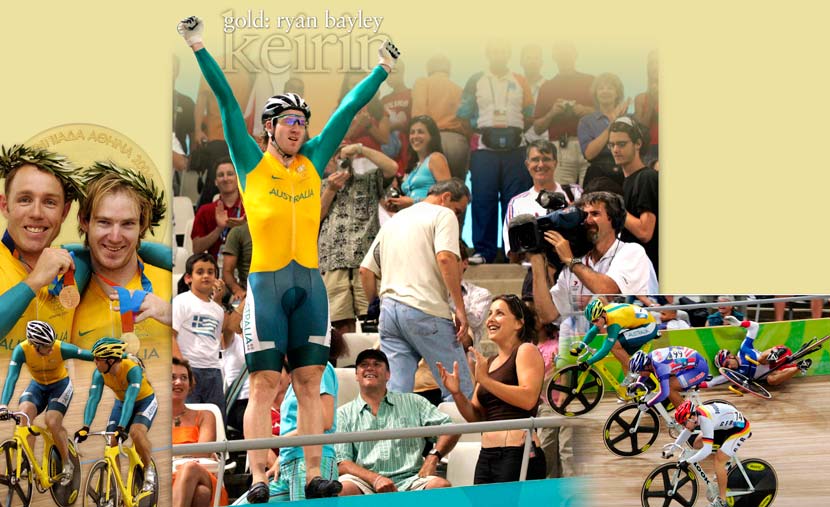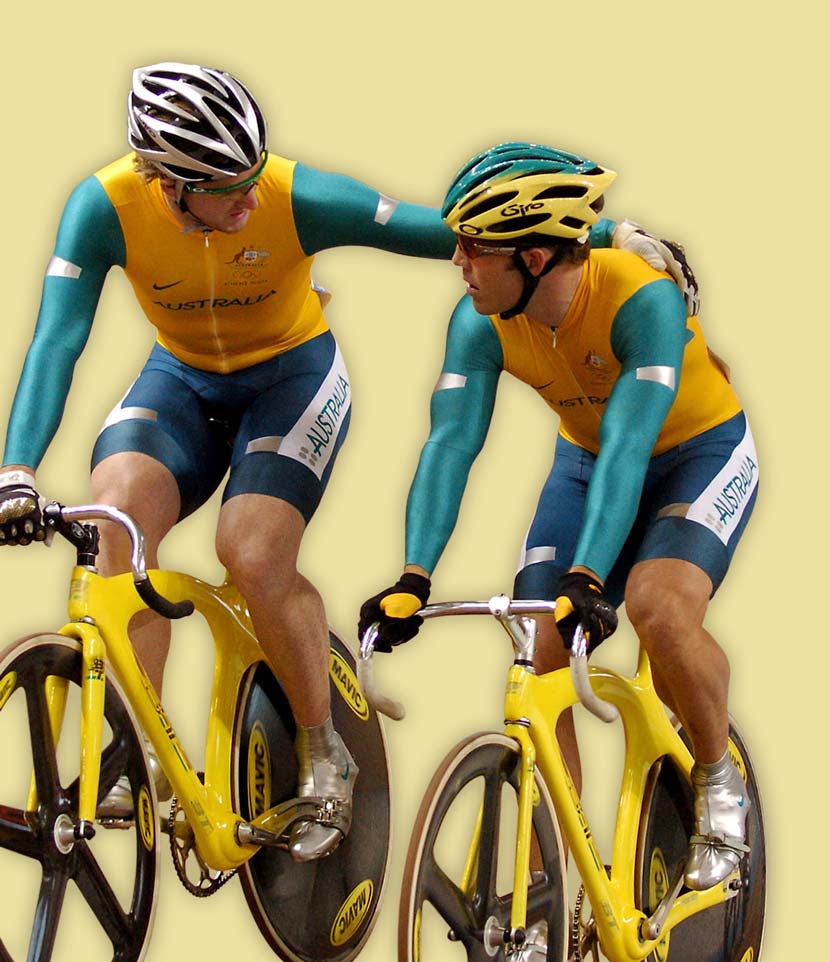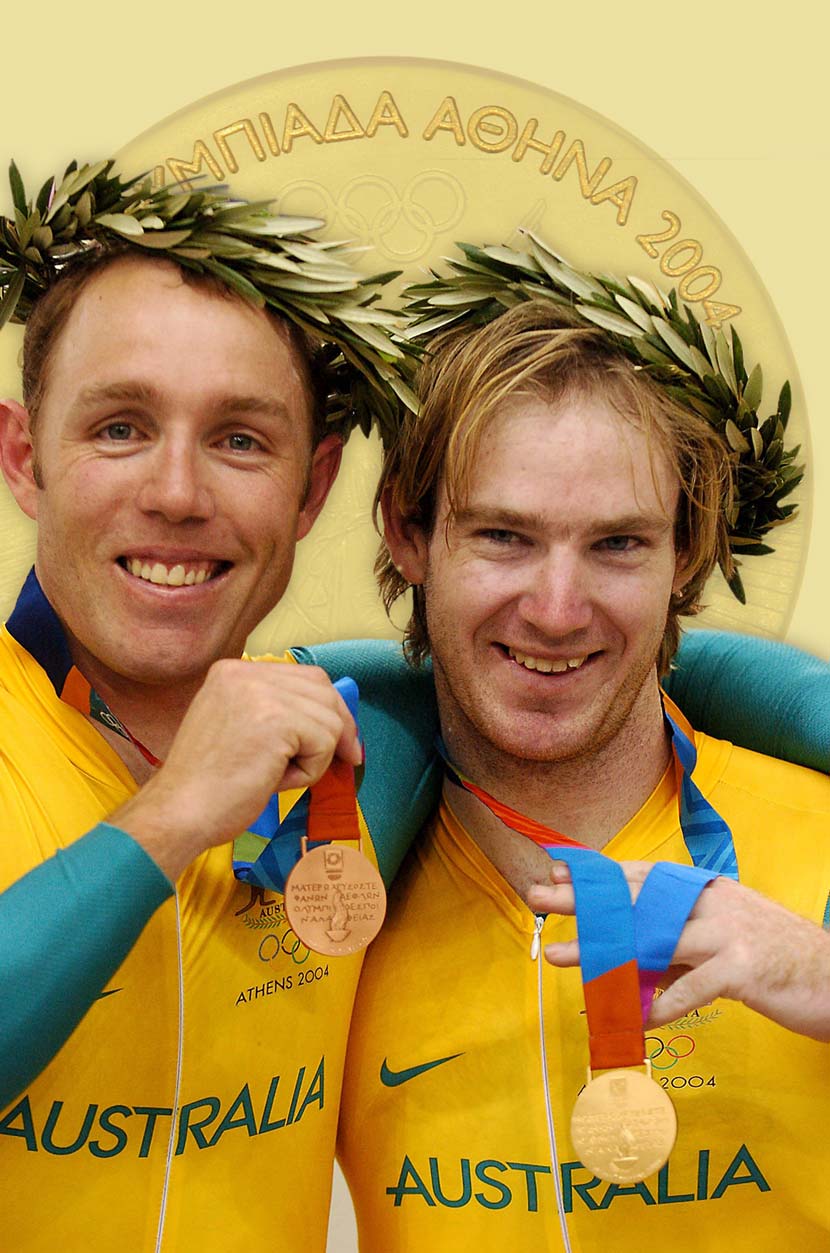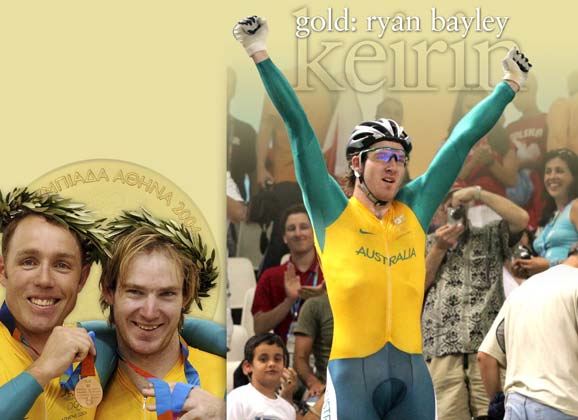On the 24th and 25th of this month, it will be 10 years since Ryan Bayley won Olympic gold medals. The sprint and keirin champion from Athens 2004 retired from racing after the Beijing Games of 2008 and he’s now living in Queensland, working for the Queensland cycling federation and loving life with his wife and two young kids.
To mark the 10th anniversary of what was an exceptional Olympiad for the Australian cycling team, RIDE is catching up with some of the personalities from the Games in Greece.

Click on the link below to listen to a brief discussion between Ryan Bayley and Rob Arnold.
[For a flashback to RIDE’s report on Bayley’s conquests in Athens, see the story beneath the SoundCloud file…]
* * * * *
“Every now and then you watch something or year hear of something and you think, ‘Oh, I should make a comeback…’ But I had my fun, did it all, but I wouldn’t give up spending time with my kids for anything. I ride my bike for fun now; I don’t do it as a job. Every time I get on my bike, it’s awesome and I absolutely love it. I do miss the racing – I do miss all that, but I never enjoyed living in a cell block and going all around the world and seeing airports, tracks and hotels and that’s it.
“I’m enjoying a bit more of a laid-back life and hanging out with my kids and giving my kids the best chance in life.”
– Ryan Bayley 17 August 2012.
Champion of the sprint and keirin at the Athens Olympics (flashback from RIDE #26, published September 2004)
Ryan Bayley has been a champion since he first started sprinting on the track but the Olympics provided the 22-year-old with a stage to put his talents on display for the world to see. He left Athens with gold in the sprint and keirin.
– By Rob Arnold
“It’s the Olympics and I was going to use every ounce of power I had. I absolutely smashed the pedals around as hard as I could.” Ryan Bayley contested a total of 22 races in three events in Athens. He recorded the fastest ever time for the second rider of the team sprint, the discipline in which his Australian team came fourth. The next morning he was the quickest man in sprint qualifying, riding 200m in 10.177 – an average speed of 70.747kph! He was the fastest cyclist at the 2004 Games and as he came out of the last turn in the final of the sprint, he knew that the gold medal was his.
“It was at the pursuit line that I knew I had it won so I sat up,” said Bayley of the third race in the sprint final against the reigning world champion, Dutchman Theo Bos. “Yep, thank you!”
The Australian’s coach, Martin Barras, said before the Games that Ryan is the hardest man to race in the sprints because his rivals never know what to expect. Now they do. He’s going to hit them hard and fast. Even if they’re paying attention it’s unlikely that even a class act like Bos would have an answer to Bayley’s blistering speed.
“I had to keep focused for the last round in Athens. I went to the front because that was the position I drew,” explained Ryan of the last race in the best-of-three sprint final. “I was riding around thinking, ‘Alright, I’ll get this guy in a position where he can’t pass me and with a lap to go – maybe a bit more – I’ll get him stuck at a point where he just can’t get around because I’ll be going quicker and quicker and quicker. The plan was to get him caught on my hip so I could leave him out to dry. But he came underneath me with two laps to go. I was like, ‘Oh okay, so he wants the front. Why?’
“Usually sprinters prefer the back spot. It’s good because you can line your rival up. But I was thinking, ‘Oh, he doesn’t want me to have the front.’ So I backed it off a bit. Took the pressure off, gave him a false gap – one that was enough to make him believe he could take the sprint. And that’s exactly when he hit it. I got up to speed and raced at him really hard.
“I came out of the corner thinking, ‘Yeah, I’ll pip him on the line.’ And then I just shot straight past him. I was a very relieved boy.”
Sprint events are over in an instant, but Bayley was able to recall all the minor details of his races even though we spoke several weeks after his return to Australia. Since dominating the keirin final to win his second gold on the last day of track competition, Ryan’s life has changed a lot although he insists it won’t make him a different person.
“Going into the Olympics it was only people on the team and those really close to cycling who knew who I was. It’s all changed. I stepped off the plane and was met by the prime minister. It’s been a big turnaround in the way people have shown respect for what I do.
“The meeting with the PM wasn’t too exciting, just the usual congratulations and the political stuff that he does, but to have him there helped it sink in that I’d done something special.”
It wasn’t the first time Bayley has beaten the best in the world. He was the keirin world champion in his first year as a senior. Success at the Olympics, however, is what has helped Ryan become known. “Everything I’ve done in the past has gone under the radar,” said Bayley. “It’s been like that right up until the Olympics.” Recognition is a good thing but the former BMX racer is quick to point out that, “it’s never been the reason I’ve ridden the bike.”
Although he is passionate about his sport, Bayley has often said that he rides because he loves it. His successes and humble, honest personality have made him an Olympian people can identify with. A diet that is almost entirely fast food is another part of his appeal, but fame hasn’t offered much in terms of corporate support. Not yet. “When I’ve done the same things other athletes yet they get the recognition while I get ignored, it makes it hard to get sponsorship. If you’re not getting exposure, sponsors don’t really care. It’s difficult to find other work when you’re doing what we do – with all the travel and stuff. But I don’t care, I’ll just keep moving on.”
With a character like Ryan on top of his trade, it’s possible his chosen sport will receive more media coverage. What a breath of fresh air it would be. “I’ve looked at people who get a lot of media, like Ian Thorpe and I’ve always thought, ‘Is that really them? Because if it is, that’s really sad.’ I’ve never wanted to be one of those stereotype athletes who have been trained to talk. I don’t want to be Ryan on the outside and Ryan on the inside. When I’m on TV, it’s just the Ryan that I am. That’s what you’re going to get.”
For the past few years Bayley has been known by two names. Many in the cycling world call him ‘Ray’, and Ryan was only too pleased to explain why. “At the Tassie track carnivals a few years ago, my name was written down as Ray Bayley in the program. For three days the commentator kept calling me ‘Ray Bayley’. I could hear it every time I raced. Eventually I went to the commentator and said, ‘Look, my name is Ryan. Ryan Bayley – not Ray.’
“In the next race, there it was again: ‘Ray Bayley is coming down the back straight…’ Every time I went to Tassie, it’d be ‘Ray’. From that carnival on, everyone in the cycling world calls me Ray.”
The two names have helped him distinguish how people know him and during a round of the sprint in Athens, it helped him deal with what he confesses was “the first time I’ve ever been nervous on a bike”. Racing against the two-time world sprint champion Laurent Gané, Bayley finally realised he was at the Olympics.
“I could hear the crowd shouting my name. The home straight was calling me Ray, the back straight was calling me Ryan and I was just stressing out thinking, ‘I’m at the Olympics, racing against Gané – what am I doing!?’ This is the rider I’ve always seen as being the Sprint King. I just realised I had to push through that thought process. I did and I went out there and I nailed it!”
That’s what he did in almost every race he contested on his way to victory in both the sprint and keirin competitions. Not only was he the fastest sprint qualifier, he was also unbeaten in the keirin. But he had to contend with both old-school riders like Gané and the best of what he calls the New Generation of sprinters.
Theo Bos and Bayley are the dominant forces of the current era and the tactics required to beat the Dutchman are different to what’s required for other riders. Ryan’s main strength is his ability to sprint faster for longer. “I’ve got a bit more length so I can afford to give some riders a false sense of security and shoot past them at the end. Not only do I win but it demoralises them a bit as well.
“It seems to work for me most of the time but it always works on the French. I don’t know why and I don’t really care. I can give them a lot of room but I always finish off the lap a lot faster than they can. I actually back off a lot – give ’em a bit of a gap – so they think, ‘Oh, I can hit it here and no one’s going to catch me from way back there.’ They’ll start their sprint from one and a half laps out and gap me, but then I just chase and run ’em down because I can go harder and longer than most sprinters.”
It’s a tactic that often gives his support crew anxiety attacks although guys like Barras are learning to live with it. Of course it helps that Bayley’s antics yielded the first gold medal for an Australian male rider in an event that falls into the ‘sprint’ category since Russell Mockridge won the kilo at the 1952 Games in Helsinki.
“Not everyone sees the racing like I do. Marv Barras doesn’t either but he understands that I know what I’m doing. I always get people telling me, ‘You’ve gotta push ’em. Make ’em run early.’ But if I do, it doesn’t work. So I’ve come up with a reverse tactic that doesn’t usually work for anyone, but it seems to work for me.
“In the second round Gané hit me hard and caught me off guard. He gapped me a fair bit – like almost half the straight – so I had a good, long run at him and chased him down and just pipped him on the line. I probably gave a few people in my pit area a heart attack. I got back to the pits with a chorus of people screamin’ at me. ‘Don’t you ever do that again!’ Huh, what? ‘Don’t you ever give ’em that much room!’ And I was just like, ‘Oh come on, get off my back.’”
Bayley had eliminated one of the favourites with his tactics but it would take a little more creativity to dispose of Bos in the final. Despite being beaten in the first race and only just winning round two, Ryan was confident that the gold medal would be his. “In the first round I hit out really hard and I didn’t think that he was going to come around me. Usually when I go that hard, I normally win. It’s like Sean Eadie says, ‘Once Ray puts his head down and stops lookin’, the race is over.’
“I came around the last corner thinking, ‘Yeah, that’s it, I’ve got that won.’ But from the corner of my eye I could see that he was popping up beside me. He got around me and won but I believe that the first round hurt his legs. To come around that fast must’ve hurt.
“In the next round, I was behind and I did the same thing to him.
“In the third round I was meant to have the front but he wouldn’t let me get there because I believe he knew that he couldn’t get around me again. Usually I’m good from the front but I thought I’d give him a false sense of security, hang back a bit and have a good run at him. I wanted to make sure I lined him up properly. I got him to go early so that I could run at him perfectly and line him up.
“After the first round I just said to myself, ‘Nah, this ain’t going to happen for him!’ I changed my mentality a bit. I had a bit of Fear Factory playing on the mini disc. I had a mix that included a bit of Metallica, Linkin Park and Ramstein and that got me goin’ a bit.
“I stepped on the track for the second race in the final and did the same thing to him – exactly what he did to me in the first round, went around the outside and bowled past him on the line.
“It was fairly close. It was, ah… not exactly what I planned. I didn’t quite line him up like I wanted to. I hit him in a bad spot and got stuck on his hip but then I found a little bit of extra speed in the last part and managed to get around him.” And it was this close call that got him to his medal winning ride in the last race of the final.
“Florian Rousseau has retired but he is the sprint legend,” said Ryan Bayley about the only rider to previously have won the keirin title at the Olympic Games. The eight-lap race that begins with a motorpacing bike leading the six finalists up to a speed of 50kph with two and a half laps remaining made its debut in Sydney. Ryan reached the final by winning each of his three preliminary rounds. He’d done the same at the world championships but Bayley learned a valuable lesson from the event in May. It’s no use winning your heats if you don’t have the energy to later win the final.

Ryan Bayley and Shane Kelly, first and third in the keirin at the 2004 Olympics.
The Frenchman Bayley so admires pinched victory from Gary Neiwand in the dying metres of an extremely close race in 2000. “In my eyes he’s one of the greatest sprinters ever,” said Ryan about Rousseau. “But I think it’s fair to say that the New Breed is coming through. You’ve got people like me and Theo and a few other ones who are popping up. And I reckon the younger generation seems to sprint longer than the older one. The old guys race more tactically with shorter bursts of pure speed. Successful sprinters these days have speed that lasts longer. Both Theo and I are that way.
“He’s a kilo rider and I’m a wannabe kilo rider. Maybe we’ll start seeing sprints that last for two laps instead of just one lap.”
The Dutch sprinter recorded a DNF in the second round and was not able to put his long sprint into practice for the last race on the track cycling program in 2004. But there was no stopping Bayley. Not even his tired legs could convince his mind that anything but first place would suffice. “My legs were just stuffed and seemed to be saying to me, ‘Forget it boy, you’re not riding today.’”
Bayley didn’t listen to his legs. He warmed up with the help of two of his heroes, Eadie and Shane Kelly. As always ‘Big Man’ was there to offer advice and motivation. And ‘Kells’ would be the other Australian starter in the keirin. “I got off the track just before the first round and thought, ‘Oh, I still feel a bit sluggish but…’”
If Ryan’s legs were suffering, he didn’t show it. Both Australians made the final so the odds were stacked in their favour, although not entirely. “I hate to race a mate. I don’t mind messing up anyone else’s race because I really don’t care about them. But I don’t want to mess up a mate’s chances,” said Bayley clearly still affected by his win at the worlds in 2001 when Jobie Dajka crashed and took out the field, leaving Ryan to race ahead and into the rainbow jersey.
“That scarred me for life,” said Bayley of the worlds in Antwerp. “When I race with another Aussie now I’m really conscious of it.”
The keirin is as close to BMX as you could get at the Olympics (until 2008 when that discipline replaces the points race in Beijing). In the final the Australians had agreed to try and help each other but that plan never came to fruition.
“I wanted to help Kells out a bit,” said Bayley about the final. “Marv said that if anyone got a chance to lead the other out, then it would be me working for Kells. It was to happen in that order because I had the speed and I had the good legs by that time; while Kells is very shifty and good at moving around and blocking people.
“Then we got on the track and Kells went straight to the front. That just blew the whole plan out of the way, so I was like, ‘Okay, no probs. We’ll just race our own race.’
“When the pace bike went off, I had a few people in front of me so I ended up pretty far back again. So I got to a point where I knew I could come home with ample speed and then I just stepped on the gas again and went straight around the outside. I hit them at a point when I knew there was a false sprint – when everyone else was going a bit soft – and with a lap to go, I hit the front. From there I put my head down and gave it everything I had for the last lap. It was a case of get out of traffic, hit the front and go for gold!”
– By Rob Arnold



